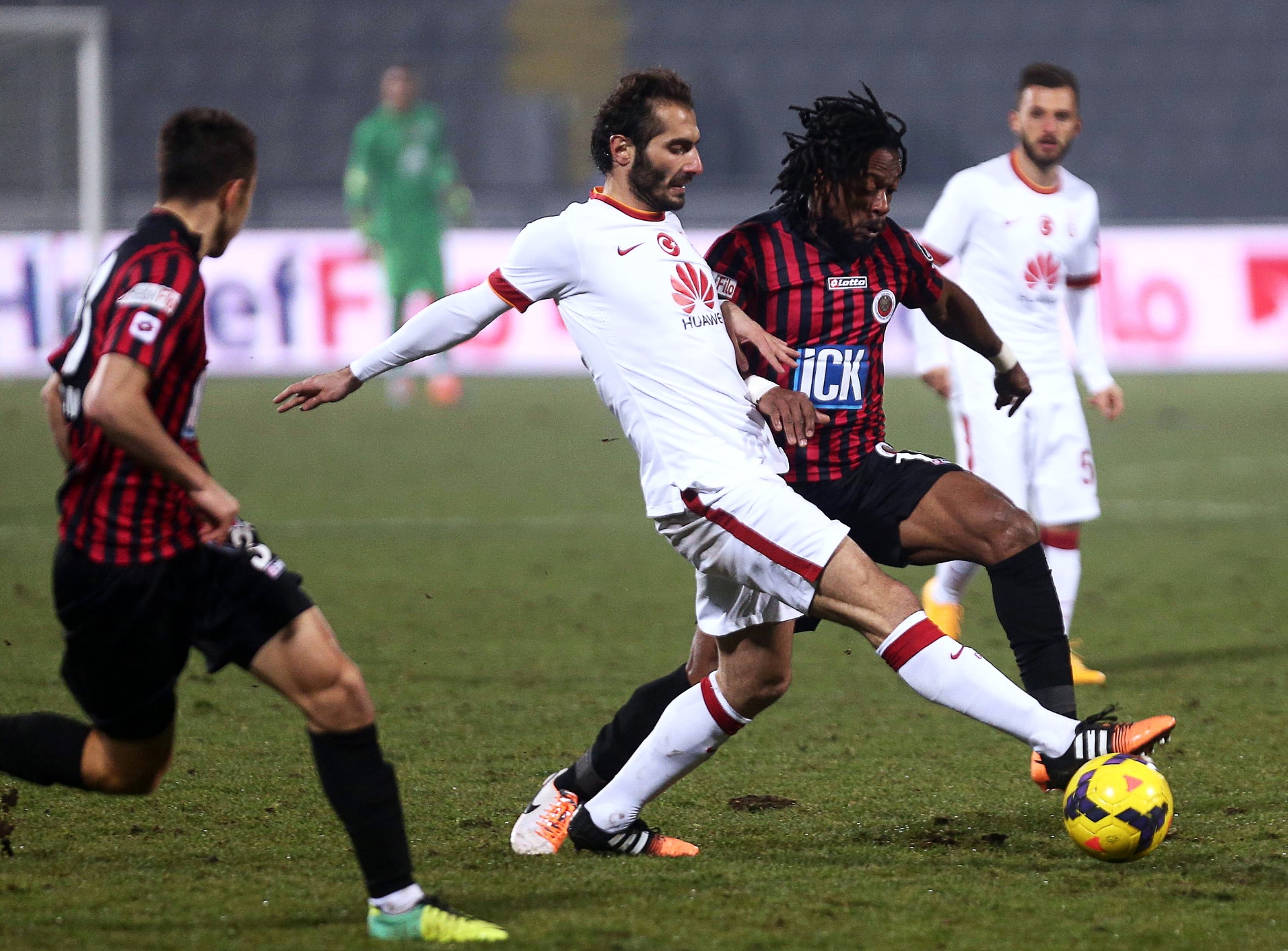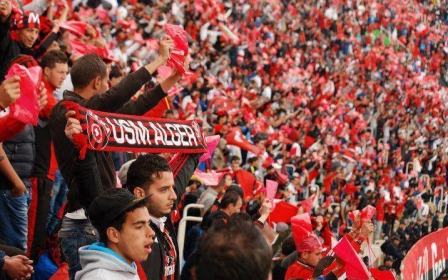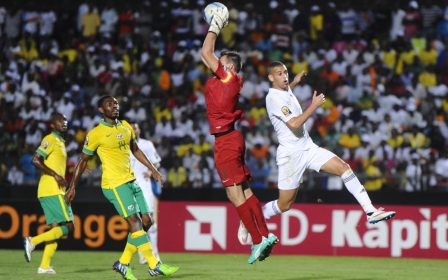Could Turkish football collapse?

ISTANBUL - Five minutes before kick-off, Deniz Dogruer was nervous. Her beloved Galatasaray – one of Turkey’s most successful football teams – was about to take on Caykur Rizespor in the Turkish Super Lig. Despite their opponents’ low ranking, Galatasaray were beset by injuries and Dogruer anticipated a tough contest.
But her nerves were misplaced – within seven minutes, Galatasaray’s star player Wesley Sneijder had given them the lead and Dogruer was standing, arms outspread, shouting: “Goal!” In normal times, Dogruer – a journalist and football blogger - would have been celebrating at Galatasaray’s stadium but, like many other passionate Turkish football fans, she has boycotted the controversial Passolig e-ticket system all season and has been watching the matches in a bar.
Attendance has fallen precipitously, compounding a host of other problems that has led many to conclude that Turkish football is in a state of deep crisis. In mid-January, Yıldız Holding – a major sponsor of Turkish football – stated that they were withdrawing their funding from the sport. The announcement renews urgent questions about the problems in Turkish football and many have wondered whether Turkish football might collapse. Some even think that might not be such a bad thing.
In the doldrums
“I have to let you know that unfortunately, today it has become meaningless to support teams or games thanks to such a fall in interest and value,” said Murat Ulker, chairman of Yıldız Holding, in a recent letter to the Turkish Football Federation (TFF).
Ulker cited low attendance, violence, and the poor atmosphere at matches as factors that had diminished the brand value of football. Yıldız Holding has invested $215m in Turkish football over almost a decade through its food brand Ulker; sponsoring the national team, Galatasaray, and fellow Istanbul club Fenerbahce, as well as grassroots football projects.
Ulker also criticised the e-ticketing system which was introduced in April 2014, saying in an interview published by Haberturk newspaper that: “No one wants their information to be collected, even by the state; this is disturbing.”
Spectators now have to acquire a Passolig card, which involves sharing their personal details with private companies and the authorities, who claim that the card will allow them to identify perpetrators of violence, reduce swearing, prevent gate-crashers, crackdown on black market ticket sales, and encourage more women and children to attend matches.
Mehmet (not his real name) is a longstanding member of Carsı, a group of ultras that support Istanbul-based team Besiktas. Carsı – many of whom are politically left-leaning and participated in the 2013 anti-government Gezi Park protests – have also been boycotting the matches in protest at Passolig. Last season Besiktas’s attendances were often around 40,000 – this year they have typically been around 3,000-5,000. “That’s been the biggest blow to football,” said Mehmet.
Mehmet sees Passolig as an attempt to control football fans by identifying fans chanting anti-government slogans and clamping down on perceived dissent: “I think [Turkish President Recip Tayyip] Erdogan sees football fans as a threat because they’re easily organised and there are a lot of them. If you have 30,000 people marching against you, there’s not much you can do to stop that.” A trial of 35 people accused of attempting to mount a coup against the government during the Gezi Park protests – including several Carsı members – is set to resume in April 2015.
Mehmet also complained about financial aspects of Passolig. Aktif Bank, which runs the card, is a subsidiary of Calık Holding – a company that was headed by Erdogan’s son-in-law. “How convenient!” exclaimed Mehmet. “Not only are you paying to get ID’d, you’re also paying them. It’s like a double insult.”
Violence, corruption, and politics
The idea of an e-ticketing system was first mooted in 2011, when the government passed a law to combat hooliganism, which included banning away fans attending derby matches between the big Istanbul teams because of the level of disorder.
Emir Guney, Director of the Sports Studies Research Centre at Kadir Has University, said that while there is a problem with fan violence in Turkish football, it is smaller than the hooliganism problem that marred British football in the 1970s and 1980s. “It is manageable” said Guney. “The fans are not violent just to be violent – they are violent because they want to be heard, and because the government and the federation oppress them with laws and regulations.” Alongside a recent prohibition on swearing, the authorities have also banned chanting and banners deemed to be political.
Many fans complain of police brutality, decrepit and unsafe stadia, high ticket prices, and suspected corruption.
“The most important thing is [a lack of] justice,” said Dogruer. “The biggest match fixing [scandal] in football happened in Turkey but the people responsible weren’t punished.”
Scores of players, officials, and referees were questioned in 2011 and charged with match-fixing – including Fenerbahce’s chairman, Aziz Yıldırım. Yet the government forced through a law limiting the penalties for both officials and clubs, and many of the charges were dropped.
The perceived lack of accountability and transparency has led to widespread disillusionment about the fairness of the game and whether the results can be trusted. “We still think we are watching a puppet show,” Dogruer said.
Some argue that the authorities are reluctant to tackle corruption in football because of the political importance of the sport in a football-mad country. Turkish clubs are typically member-based associations that vote for the club’s chairman - often a local politician, whose political fortune may be tied to the success of the club. “Politicians need these clubs,” saids Ahmet – a prominent sports lawyer who did not want his real name to be disclosed. “Sport is more powerful than politics now.”
The government also has close links to the TFF; appointing federation members and using its financial leverage to support Turkish football clubs – many of which are steeped in financial strife.
Many clubs buy players at high prices, pay them exorbitant salaries, and then struggle to recoup the money at a later date as their value declines. The government has postponed the debts of some football clubs for up to ten years. The state also works with banks to open credit to the clubs. The debts keep accumulating. In the UK, professional football teams are generally commercial entities that are legally responsible for the club’s debts – in Turkey they are usually non-commercial organisations without these responsibilities.
“If the clubs were [commercial] firms, they would be bankrupt and the directors would be in jail,” Ahmet said. “But these are football clubs and no one can touch a sports club in Turkey.”
'It could hit rock bottom'
Ahmet argued that Yıldız Holding’s decision to withdraw their sponsorship from the game will have little impact on the bigger professional teams in the short-term because of the political importance of football and the government-leveraged financial support. “The Turkish Football Federation always has a queue of sponsors,” he said, pointing out that the sponsors of the top two professional leagues and the company that broadcasts the matches are all linked to the state.
Istanbul’s big three clubs – Besiktas, Fenerbahce, and Galatasaray – are supported by the vast majority of Turkish football fans and their political power and supporter base ensures revenue generating capabilities.
“The impact [of Yıldız Holding’s decision] will be more on the grassroots level and on smaller teams whose revenue pool will be smaller,” Guney said.
Yet, although Turkish football won’t implode overnight, the decision to pull the funding suggests a lack of faith in Turkish football which might unnerve other sponsors and the authorities – especially as Yıldız Holding are generally regarded as a religiously conservative conglomerate with close ties to Erdogan.
Guney said that if more sponsors pull out, if the company broadcasting football continues to struggle and collapses, or if the government loses the next election and its economic influence, then the system could collapse.
“It could hit rock bottom,” he said, “which maybe is also the solution to these problems because we need to start from scratch.”
An uncertain future
Guney pointed out that many of the problems in Turkish football are fairly longstanding – but the decimated attendances linked to the Passolig boycott appears to be the key factor behind Yıldız Holding’s decision.
Turkey’s constitutional court will rule on whether the Passolig e-ticket system breaches consumer and data protection rights in June. Whatever the ruling, the problems in Turkish football will remain profound.
The TFF did not reply to specific questions posed by Middle East Eye but provided a statement in which they said that the federation is working to “eradicate violence and disorder from stadiums, develop our football culture and open doors to a peaceful football fandom. Therefore we are applying zero tolerance policy to tackle all of those problems.”
Some argue that the opinions and grievances of fans could be aired and addressed through the formation of an umbrella supporters’ organisation. “If the fans will feel that they are listened to and that things are changing, most of them won’t act violently,” argued Guney. “Some people will always act violently but then it will be easier to act on the small [violent] minority, rather than against the whole population which is against their system!”
“Injustice, match-fixing, e-tickets – Turkish fans lost their joy in football, and they are so angry,” said Dogruer as the camera revealed Galatasaray’s sparsely populated stands. Although she misses the stadium, she will keep boycotting the Passolig system if it remains. “The stadium has been empty for a long time now and we are proud of it.”
Middle East Eye propose une couverture et une analyse indépendantes et incomparables du Moyen-Orient, de l’Afrique du Nord et d’autres régions du monde. Pour en savoir plus sur la reprise de ce contenu et les frais qui s’appliquent, veuillez remplir ce formulaire [en anglais]. Pour en savoir plus sur MEE, cliquez ici [en anglais].




